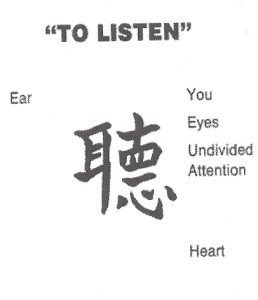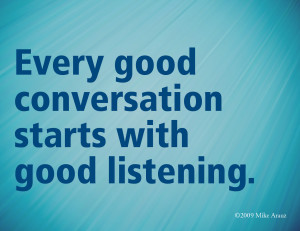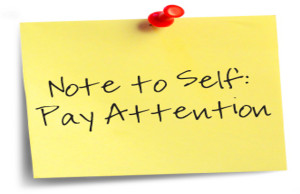 We live in a noisy world. Until the power goes out we don’t realize how much background noise exists in our everyday life. Our brains have become skilled at blocking most of this out to preserve our sanity. Not hearing or noticing has become necessary to our existence, but it may now be creating new problems. We don’t truly hear what is being said to us. Although we have been repeatedly told that multi-tasking is either impossible or inefficient, we all do it to some extent.
We live in a noisy world. Until the power goes out we don’t realize how much background noise exists in our everyday life. Our brains have become skilled at blocking most of this out to preserve our sanity. Not hearing or noticing has become necessary to our existence, but it may now be creating new problems. We don’t truly hear what is being said to us. Although we have been repeatedly told that multi-tasking is either impossible or inefficient, we all do it to some extent.
More importantly, are you listening when someone is talking to you? A teacher comes to the library with a request. Do you always give him or her your full attention or are you already juggling it with other tasks you have? When a student asks a question, how often do you answer it as rapidly as possible rather than asking for further information to be sure you have fully understood what is wanted?
Active listening is a form of respect. It builds a relationship. With teachers this can translate into future collaborations. With students it creates trust. Making active listening a standard practice is difficult. We have so much to do. We are pulled in so many directions. And yet, our students and teachers are our number one priority. We have no purpose unless we are working with them.
 The first step in active listening is to look at the person. Not only does it establish a connection, but it helps you focus on being tuned into what is being said. Do not think of what your response will be while they are talking. If it’s lengthy, nod and engage in other body language to show you are interested and paying attention. When they are finished, briefly restate what you heard to confirm you understood. Ask any necessary clarification questions to be sure you will be providing what they want. Finish with, “Is there anything else?”
The first step in active listening is to look at the person. Not only does it establish a connection, but it helps you focus on being tuned into what is being said. Do not think of what your response will be while they are talking. If it’s lengthy, nod and engage in other body language to show you are interested and paying attention. When they are finished, briefly restate what you heard to confirm you understood. Ask any necessary clarification questions to be sure you will be providing what they want. Finish with, “Is there anything else?”
Rewarding as active listening is with teachers (and anyone else with whom you have a relationship) doing so with students brings even more benefits. Kids don’t share much with adults because they have assumed or know we aren’t listening and only hear what we want or expect. And we are their role models.
The more you truly listen to your students, the more they recognize you respect them. In turn, they will trust you. Whether they share their favorite books and authors with you, why they like a particular video game, a special hobby, or whatever is important to them, they will be grateful for a dialogue in which you treat them like a valued equal. You have opened a door to sharing knowledge and who knows what else.
